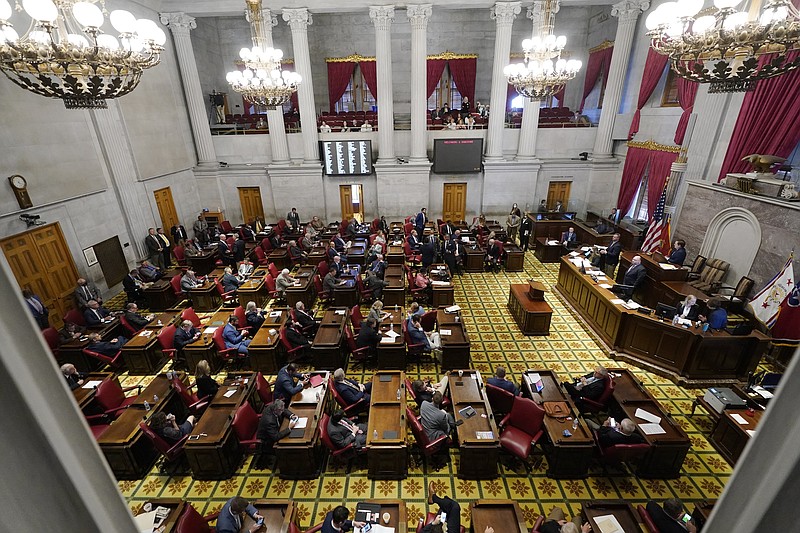Don't let your eyes glaze over when you get to the small print -- the four amendments proposed for the Tennessee Constitution -- on your ballot for the Nov. 8 mid-term election.
Those four amendments matter, and you have a voice.
It's been said of these amendments that three of them are widely thought to be bipartisan.
But the first one is a doozy, and not as transparent as it seems, because -- well, it's about unions, and in Tennessee, our super-majority Republican state leaders think "union" is a five-letter four-letter word.
The proposed fourth amendment, we think, also is a trick question.
›Amendment 1 would add a whole new section to our constitution. Vote "no."
Here's the wording:
"It is unlawful for any person, corporation, association, or this state or its political subdivisions to deny or attempt to deny employment to any person by reason of the person's membership in, affiliation with, resignation from, or refusal to join or affiliate with any labor union or employee organization."
Here's the thing: Tennessee already is, by current law, a right-to-work state. That means we can't be forced to join a union or be denied a job in a union shop if we don't want to join and pay dues ourselves. Still, the union rules and pay scales would apply to us.
Putting this in the state constitution has no reasonable purpose beyond hamstringing unions' ability to help employees bargain with their employers for better wages, benefits and working conditions. More to the point, putting it in the constitution also hamstrings future lawmakers should choices about policies and trends change.
And that hamstringing matters.
› Historically, wages for union workers average about 11% more than those of non-union workers. The same is true for benefits.
› Tennessee now has the largest number of minimum-wage workers earning $7.25 an hour. That ranks us as the 11th poorest state in the nation.
› According to MIT's Living Wage Calculator, a living wage needed for an adult with one child in Hamilton County is $28.13 an hour and $15.00 for someone without children.
› And here's the fine point: Tennessee workers, struggling to rise above mere subsistence, are beginning to embrace unions. Our state is seeing a 24% increase in the number of Tennessee workers electing to form unions.
Can there be any doubt that Tennessee's 421 labor unions and the increase in their rate of growth is the real aim behind our GOP corporate-friendly lawmakers' proposed addition of Amendment 1? Vote no.
› Amendment 2, with wording that really will make your eyes hurt, provides constitutional protocol in providing for the temporary line of succession to the governor's seat in the event he or she is incapacitated. Vote yes.
Let us put this another way. It would eliminate another opportunity for our General Assembly and government to create chaos in an already chaotic time -- something they're good at.
This is no-brainer. Vote yes.
› Amendment 3 would clean up what we see as 150 years of Tennessee foot-dragging on slavery. Vote yes.
Our Constitution was amended in 1865 to prohibit nearly -- nearly -- all forms of slavery. But a single, murky line was left to allow slavery and involuntary servitude for people convicted of crimes.
Amendment 3 would replace this line with an unmistakable ban: "Slavery and involuntary servitude are forever prohibited in this State."
This is a must pass. Vote yes.
› Amendment 4 would repeal a ban on clergy serving in the General Assembly.
It seems it should be a given, but it's not. Yet, it still leaves the state constitution without what we see as true religious freedom.
We're all for a clear divide between church and state, but we already have long been ignoring what the U.S. Supreme Court told us decades ago was an unenforceable ban of religious leaders serving as our lawmakers.
That original ban came about as states wrote constitutions soon after the American Revolution and sided with our founders' thinking.
But in 1977, Chattanooga's late Rev. Paul McDaniel ran to be a delegate in a constitutional convention. His opponent, the late Selma Cash Paty, challenged his name on the ballot, citing the state constitution's wording about clergy. She won a Tennessee Supreme Court ruling. In 1978, however, the U.S. Supreme Court decided the ban was unconstitutional.
That ban reads -- "Whereas ministers of the Gospel are by their profession, dedicated to God and the care of souls, and ought not to be diverted from the great duties of their functions; therefore, no minister of the Gospel, or priest of any denomination whatever, shall be be eligible to a seat in either House of the Legislature."
McDaniel, who remained on the ballot during his appeal, won the delegate's race and served in the state convention. He went on to become a Hamilton County commissioner for 20 years.
On its face, this amendment seems smart, but there's a fly in the ointment. The already ignored and unenforced religious ban should make us all wonder why the rewrite doesn't extend to two other outdated prohibitions: One preventing atheists from being lawmakers and another prohibiting "any person who shall ... fight a duel... ."
Vote no and send this one back to the drawing board.
